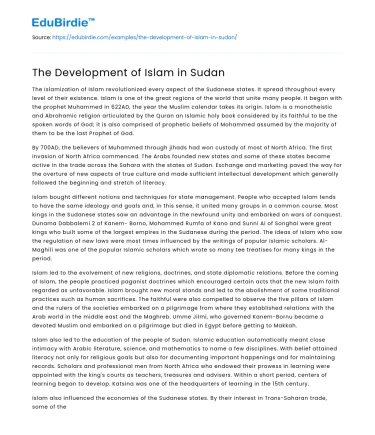The Islamization of Islam revolutionized every aspect of the Sudanese states. It spread throughout every level of their existence. Islam is one of the great regions of the world that unite many people. It began with the prophet Muhammed in 622AD, the year the Muslim calendar takes its origin. Islam is a monotheistic and Abrahamic religion articulated by the Quran an Islamic holy book considered by its faithful to be the spoken words of God; it is also comprised of prophetic beliefs of Mohammed assumed by the majority of them to be the last Prophet of God.
By 700AD, the believers of Muhammed through jihads had won custody of most of North Africa. The first invasion of North Africa commenced. The Arabs founded new states and some of these states became active in the trade across the Sahara with the states of Sudan. Exchange and marketing paved the way for the overture of new aspects of true culture and made sufficient intellectual development which generally followed the beginning and stretch of literacy.
Save your time!
We can take care of your essay
- Proper editing and formatting
- Free revision, title page, and bibliography
- Flexible prices and money-back guarantee
Islam bought different notions and techniques for state management. People who accepted Islam tends to have the same ideology and goals and, in this sense, it united many groups in a common course. Most kings in the Sudanese states saw an advantage in the newfound unity and embarked on wars of conquest. Dunama Dabbalemi 2 of Kanem- Borno, Mohammed Rumfa of Kano and Sunni Ai of Songhai were great kings who built some of the largest empires in the Sudanese during the period. The ideas of Islam who saw the regulation of new laws were most times influenced by the writings of popular Islamic scholars. Al-Maghili was one of the popular Islamic scholars which wrote so many tee treatises for many kings in the period.
Islam led to the evolvement of new religions, doctrines, and state diplomatic relations. Before the coming of Islam, the people practiced paganist doctrines which encouraged certain acts that the new Islam faith regarded as unfavorable. Islam brought new moral stands and led to the abolishment of some traditional practices such as human sacrifices. The faithful were also compelled to observe the five pillars of Islam and the rulers of the societies embarked on a pilgrimage from where they established relations with the Arab world in the middle east and the Maghreb. Umme Jilmi, who governed Kanem-Bornu became a devoted Muslim and embarked on a pilgrimage but died in Egypt before getting to Makkah.
Islam also led to the education of the people of Sudan. Islamic education automatically meant close intimacy with Arabic literature, science, and mathematics to name a few disciplines. With belief attained literacy not only for religious goals but also for documenting important happenings and for maintaining records. Scholars and professional men from North Africa who endowed their prowess in learning were appointed with the king's courts as teachers, treasures and advisers. Within a short period, centers of learning began to develop. Katsina was one of the headquarters of learning in the 15th century.
Islam also influenced the economies of the Sudanese states. By their interest in Trans-Saharan trade, some of the states went further to improve their economic associations by converting to Islam. Since Islam was a uniting force, invariably, most of the traders from north Africa started trading with converted states and his peoples. The new religion was also instrumental to the extent of stability and instability in the states. The beginning of Islam at the state level also brought with political schemes and manipulations. In most cases, religious fanaticism and intolerance displayed by the kings led to inferable decrees that eventually brought the destruction of the political harmony of the kingdoms. The likes of Dunama Dabbalemi who ordered the destruction of a sacred traditionally object of worship called Mune believed to contain the guardian spirit of the state. These conducts on the other hand enhanced the allegiance of the Muslim community to the kings.
Finally, the introduction of Islam also brought modernity to some of the states. Islam opened the way for major idealistic businesses with notable civilizations such as the Egyptian civilizations. Over time, architectural designs came to reveal their impact. Houses, palaces, and mosques were built to imitate the houses in Egypt or elsewhere. Similarly, new facilities and such as recreational facilities and roads are constructed to singular styles. clothes and general fashion also began to change as women chose to appear in covered clothing while the men wore traditional Muslim turbans on their heads.






 Stuck on your essay?
Stuck on your essay?

